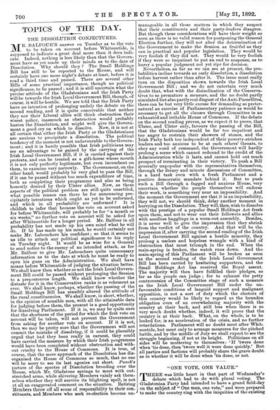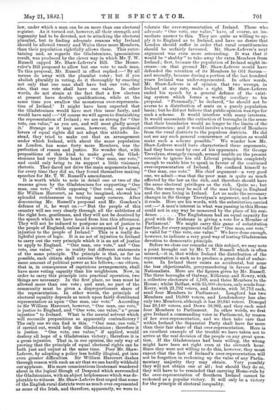"ONE VOTE, ONE VALUE."
riutERE was little heart in that part of Wednesday's _L debate which had to do with plural voting. The Gladstonian Party had intended to have a grand field-day on the subjeet of "One man, one vote," and were prepared to make the country ring with the iniquities of the existing law, under which a man can be on more than one electoral register. As it turned out, however, all their strength and ingenuity had to be devoted, not to attacking the electoral pluralist, but to finding adequate reasons why Ireland should be allowed twenty and Wales three more Members, than their population rightfully allows them. This enter- taining and, as regards the Glad stonians, ignominious result, was produced by the clever way in which Mr. T. W. Russell capped Mr. Shaw-Lefevre's Bill. The Home- ruler's Bill proposed to allow but one vote to each man. To this proposal, Mr. Russell in effect replied By all means do away with the pluralist voter ; but if you abolish plurality in voting, do it thoroughly by enacting not only that one man shall have but one vote, but also, that one vote shall have one value. In other words, do not strain at the fact that a few electors at present have double qualifications, while at the same time you swallow the monstrous over-representa- tion of Ireland.' It might have been expected that the Gladstonians would have met this issue fairly, and would have said Of course we will agree to diminishing the representation of Ireland ; we are as strong for "One vote, one value," as you are, and will most gladly accept it.' Strange as it may seem, however, the professed lovers of equal rights did not adopt this attitude. In- stead, they tried to make out that an arrangement under which Ireland, with about the same population as London, has some forty more Members, was the perfection of reason and justice. No wonder that, with propositions of this kind to make good, the Glad- stonians had very little heart for "One man, one vote," and could only bring to its support a little visionary rhetoric. They dared not drive the main arguments home, for every time they did so, they found themselves making speeches for Mr. T. W. Russell's amendment. It is worth while to note in detail one or two of the reasons given by the Gladstonians for supporting "One man, one vote," while opposing "One vote, one value."
Sir William Harcourt, as may be imagined, showed his splendid recklessness in turning nasty corners. After denouncing Mr. Russell's proposal and Mr. Goschen's defence of it, he went on :—" But the people of this country will see very clearly through all the subtleties of the right hon. gentleman, and they will not be deceived by the speech which we have heard from him this afternoon. They will not be induced to postpone an act of justice to the people of England, unless it is accompanied by a gross injustice to the people of Ireland." This is a really de- lightful piece of logic. It is an act of injustice to Ireland to carry out the very principle which it is an act of justice to apply to England. "One man, one vote," and "One vote, one value," are in reality but different statements of the same principle. The principle is that, as far as possible, each citizen shall exercise through his vote the same amount of political power as his fellows,—no citizen, that is, in consequence of capricious arrangements, shall have more voting capacity than his neighbours. Now, in order to carry this principle into practical operation, two things are necessary. In the first place, no man must be allowed more than one vote ; and next, no part of the community must be given a disproportionate share of the representation. In other words, the principle of electoral equality depends as much upon fairly distributed representation as upon "One man, one vote." According to Sir William Harcourt, however, "One man, one vote," is justice to England, and "One vote, one value," a" gross injustice" to Ireland. What is the mental solvent which will reconcile propositions so apparently contradictory ? The only one we can find is this. "One man, one vote," if carried out, would help the Gladstonians ; therefore it is justice. "One vote, one value," if applied, would destroy all hope of a Gladstonian victory; therefore it is a gross injustice. That is, in our opinion, the only way of proving that the principle of equal electoral rights can be both just and unjust at the same time. Poor Mr. Shaw- Lefevre, by adopting a policy leas boldly illogical, got into even greater difficulties. Sir William Harcourt dashes through reason with such an air that we can hardly withhold our applause. His more conscientious lieutenant wandered about in the logical Slough of Despond which surrounded the Gladstonians, with an abject helplessness which was de- plorable to witness. Mr. Shaw-Lefevre first urged that some of the English rural districts were as much over-represented as some of the Irish, and therefore, apparently, we were to tolerate the over-representation of Ireland. Those who advocate "One vote, one value," have, of course, an im- mediate answer to this. They are quite as willing to ap- ply it to England as to Ireland, and have no desire that London should suffer in order that rural constituencies should be unfairly favoured. Mr. Shaw-Lefevre's next argument was even more astounding. It was that it would be " shabby " to take away the extra Members from Ireland ; first, because the population of Ireland might in- crease—on that ground Mr. Shaw-Lefevre would have defended the retention of its Members by Old Sarum— and secondly, because during a portion of the last hundred years Ireland was under-represented. In other words, Mr. Shaw-Lefevre is of opinion that two wrongs, in Ireland at any rate, make a right. Mr. Shaw-Lefevre ended his speech by a general defence of the exist- ing system which forms a worthy corollary to his proposal. "Personally," he declared, "he should not be averse to a distribution of seats on a purely population basis; but he did not believe that public opinion was ripe for such a scheme. It would interfere with many interests. It would necessitate the extinction of boroughs in the sense that their boundaries would no longer be the limits of the constituencies ; and it would involve a transfer of Members from the rural districts to the populous districts. He did not see any such general concurrence of opinion as would make such a scheme possible." We wonder how Mr. Shaw-Lefevre would have characterised these arguments, had they been used by one .of his opponents. Sir George Trevelyan, strangely enough, seemed unable on the present occasion to ignore his old Liberal principles completely enough to enable him to speak in favour of the continued over-representation of Ireland. He confined himself to "One man, one vote." His chief argument—a very good one, we admit—was that the poor man is quite as much affected by the law as the rich, and therefore should have the same electoral privileges as the rich. Quite so ; but then, the same may be said of the man living in England and the man living in Ireland. Let us make the necessary changes in Sir George Trevelyan's argument, and see how it reads. Here are his words, with the substitution carried out :—‘ A man's interest in what was passing in this House could not in any way be measured by the place of his resi- dence The Englishman had an equal capacity for good with the Irishman in giving a vote for a Member of Parliament.' We might carry this game of substitution further, for every argument valid for "One man, one vote," is valid for " One vote, one value." We have done enough, however, to indicate a very good way of testing Gladstonian devotion to democratic principle. Before we close our remarks on this subject, we may note a point brought out by Mr. T. W. Russell which is often missed,—it is, that within Ireland the distribution of the representation is such as to produce a great deal of unfair- ness. In Ireland there exists an accidental, but none the less objectionable, gerrymandering in favour of the Nationalists. Here are the figures given by Mr. Russell. The three boroughs of Galway, Kilkenny, and Newry, with a collective electorate of 5,169, send three Members to the House ; whilst Belfast, with 35,000 electors, only sends four. Kerry, with 21,792 voters, and Antrim, with 313,712 each, send four Members to Parliament. Longford has two Members and 10,000 voters, and Londonderry has also only two Members, although it has 20,845 voters. Donegal has 28,149 voters, and Down 38,982, and they each send four Members to Parliament. In other words, we first give Ireland a commanding voice in Parliament, by reason of her over-representation, and we then take care that within Ireland the Separatist Party shall have far more than their fair share of that over-representation. Here is an excellent example of the trouble we have taken not to arrive at the real decision of the people on any great ques- tion. If the Gladstonians had been willing, the wrong might have been set right even at the eleventh hour.
Since they were not willing to do this, however, they must expect that the fact of Ireland's over-representation will not be forgotten in reckoning up the value of any Parlia- mentary majority they may obtain. Very possibly they will not obtain one at all ; but should they do so, they will have to be reminded that carrying Home-rule by the over-representation of Southern Ireland cannot be reckoned as a popular victory. It will only be a victory for the principle of electoral inequality.



































 Previous page
Previous page